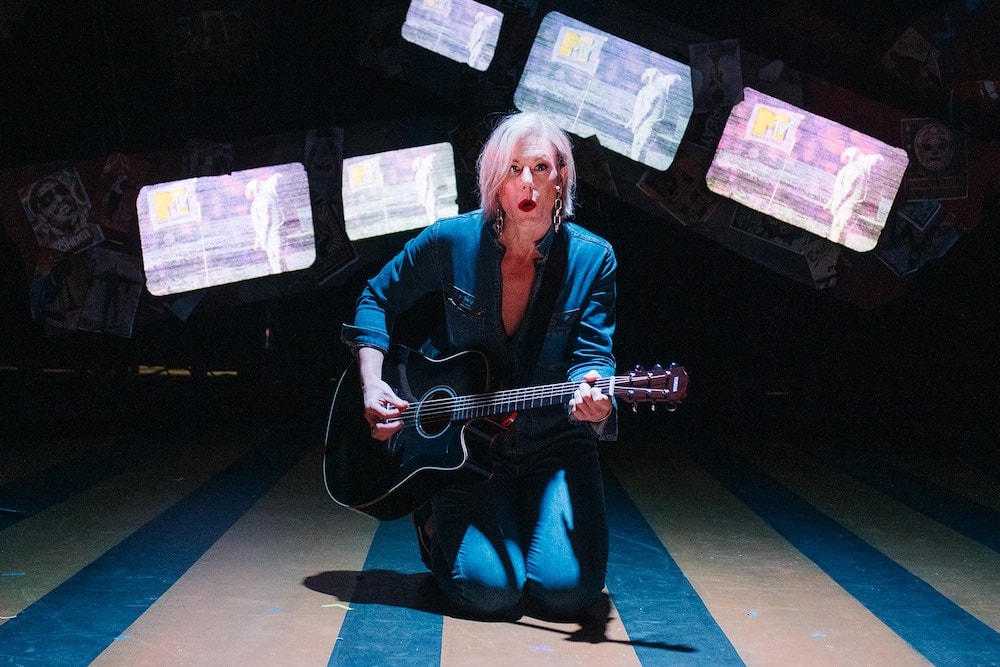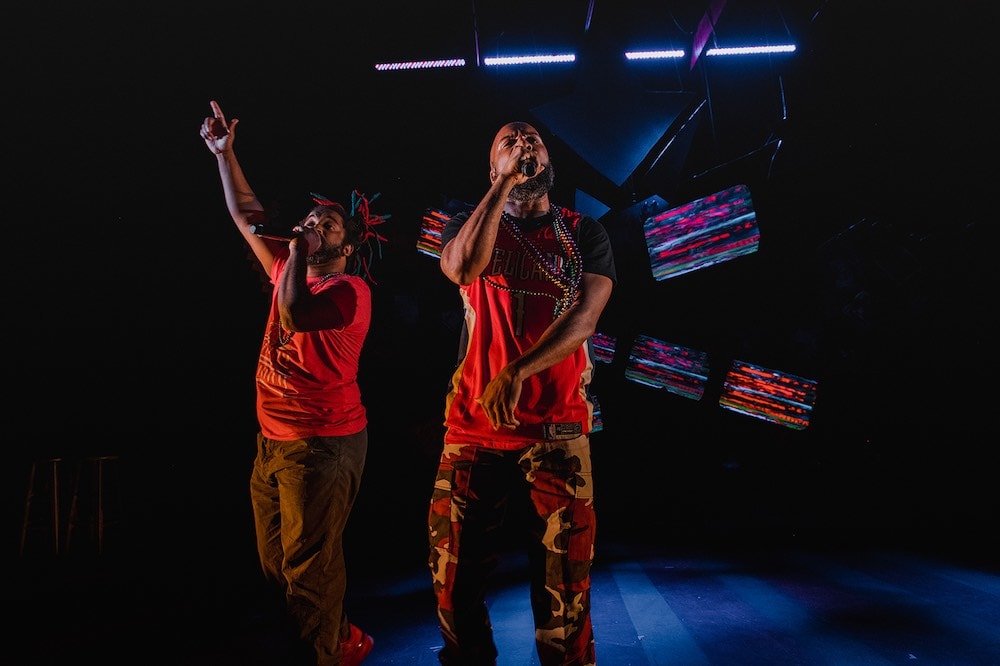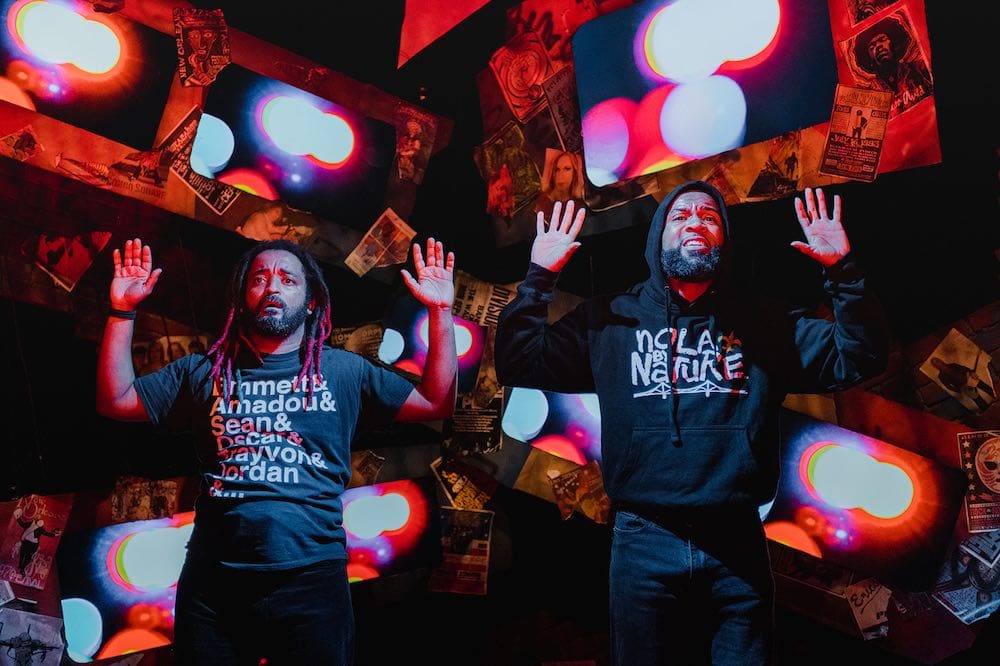The Keegan Theatre’s streamed live performances from their stage are the closest thing I’ve seen so far to theater as we remember it avant le deluge. They are presenting two pieces in repertory, which investigate vital aspects of identity, from transgender awareness to Black Lives Matter, and which enhance our respect for the resilience of the human spirit. Trans Am and From Gumbo to Mumbo are part of the crucial work of dismantling America’s unspoken caste system, as described by Isabel Wilkerson in her best-selling book, Caste: The Origins of Our Discontents.
It is easy to see what the two productions have in common, and why they belong together.
A transgender woman must struggle with the expectations of what a male should be, and face insults, threats, violence, even death. A young Black man must deal with psychological projections of all kinds whatever his actions or personality. He too will confront insults, threats, violence, and the possibility that he will lose his life thanks to the ignorance and cruelty of others. And in both Trans Am and From Gumbo to Mumbo, there is a momentous breakthrough: the protagonists, although faced with terrible injustice, are ultimately able to live life, if not exactly on their own terms, as their authentic selves.
Like everyone else these days, I am a Netflix fan, but theater still has irreplaceable advantages. Instead of the detailed surroundings we find in on television, there is a largely fixed space: the set. Although this may seem more limited, in a way it isn’t; it gives more scope for the imagination, and a greater focus on the performer. In theater, unlike on film, speech is unquestionably the star, and those of us who love language, from blank verse to hip-hop, can revel in the aural experience. In addition, theater, unlike the screen, is the kingdom of the actor.
Fortunately, Trans Am and From Gumbo to Mumbo feature performers who excel in that most difficult of roles: themselves. And, of course, it is live, so anything can happen.
Trans Am
By Lisa Stephen Friday
Featuring the music of Lisa Jackson & Girl Friday
Trans Am explores the most complicated and personal parts of the human quest for authenticity, through the lens of Lisa Stephen Friday’s trans journey. Friday, along with director Fred Berman, brings us a world premiere that is part rock ‘n’ roll, part poetry, and part searing personal history of a particularly harrowing path to self-discovery.

Friday skillfully recounts her initial awakening, a preference for women’s clothes. She is nine years old, in Fayetteville, Georgia, land of NASCAR, where she is “good at being a boy” and her environment is “good at keeping her a boy.” When her mother finds Lisa in one of her skirts, she says, “What are you doing? Boys do not wear women’s clothes.”
The guitar offers Friday a vocation; MTV brings Madonna, Michael Jackson, and Boy George. She discovers Freddie Mercury in “I Want to Break Free.” Cracks begin to appear in the mainstream façade that she has been forced to cultivate.
Like many before her, she escapes to New York. She becomes lead singer in a cult favorite glam-rock group, Lisa Jackson & Girl Friday. They play the Lion’s Den in the West Village, and the Parkside Lounge in the East. Princess Diandra is there. Michael Musto is there, writing a review. Miss Rose is at the door. They move on to CBGBs, and she is introduced to the music of MC5, The Stooges, and the New York Dolls.
On tour with The Buddy Holly Story, she has a “showmance” with an older woman and hangs out with the gay boys. In Tulsa, she goes to a gay bar behind a strip mall and sees a drag queen there. Her companion asks if she is attracted to drag queens. Friday, feeling safe enough with her “cougar” to speak out, tells her “I want to be them.”

In the early 2000s, Friday notes, there was no language for nonbinary people. “Out” transgender people were few and far between. As she begins to transition, she encounters a black hole: no health insurance. She finds a clinic on 8th Avenue and 14th Street with sliding scale fees and receives testosterone blockers and small doses of estrogen. When she goes to fill her prescription, still (to the unenlightened) Stephen Mark Friday, the pharmacist, in front of the long line, announces, “Don’t you know what this is going to do to you?” She feels blamed, judged, alone amid 8 million people. Worse, her family attempts to enroll her in gay conversion therapy. She tells them they are wrong, and reminds herself to play harder, sing harder, and not to become bitter.
The band has gigs, but no money, no record deal and no agent. Her drinking becomes a problem, and she has an on-stage freakout. The band breaks up. She finds sobriety and falls in love with her best friend, an 18-year-old female. When her relationship ends, she goes to therapy, with an older queer woman who has “seen it all.” With help, she learns to face the enormousness of what it is to be trans in America. Loss of childhood. Inability to grow up female. Being told that she is shameful, degenerate, worthless. The struggle with internalized transphobia.
Today, in her last musical number, she reminds us, she is “A-OK,” having shed the self-hatred caused by her oppression. The music of Lisa Jackson & Girl Friday is a provocative counterpoint to the dramatic highlights of Lisa’s story. Yes, Lisa, you are indeed A-OK! You are an inspiration to us all.
From Gumbo to Mumbo
By Drew Anderson and Dwayne Lawson-Brown
From Gumbo to Mumbo, a Helen Hayes nominee and Charm City “Best of Fringe” winner, is written and performed by Drew Anderson and Dwayne Lawson-Brown. It is the story of two friends, as close as brothers, one from Southeast DC and one from New Orleans. Like brothers, they often compete, over whose hometown has the best food, or who has the best girlfriend. Each of them is in his own way a hero, and each of them, under the skillful direction of Duane Richards II, will give voice to some of the finest poetry you will hear on a stage.

Anderson is a proud New Orleans native and former science teacher. He attended a Catholic boys’ high school, where there was daily prayer. He was bullied and later befriended the bully, learning to his surprise that they had some of the same problems. He came to DC for college, but he misses the pink flowers of NOLA, “the price of misunderstood beauty.”
Lawson-Brown, who grew up in Southeast DC, had a front-row seat for gentrification. Now a confident b-boy and hip-hop performer, he has a romantic view of women. We see him chatting, softly, with a mannequin in a polka-dot dress. One of his finest moments is a monologue about how men cannot cry. “We can’t cry. How can we reach for the stars? We can’t even see the sky.”
It’s difficult to convey the nature of the dialogue, which is rapid-fire and full of internal rhyme. DC’s Lawson-Brown references the Mayor for Life, Metro SmarTrip Cards, and the joys of having a safe ride home. He says, “My style be fresh like Whole Food produce,” and complains that “between COVID and Trump protestors we’ll get to everything late.”
Anderson roots for LSU and the Saints and reminds us that “George [W.] Bush doesn’t care about Black people.”. He memorably recounts Barbara Bush’s appalling comment after Katrina: “And so many of the people in the arena here, you know, were underprivileged anyway, so this, this is working very well for them.”
The stage for both productions has a backdrop of what look like TV screens. During Trans Am we see Freddie Mercury, David Bowie, and various MTV images. During From Gumbo to Mumbo we see pictures of Black people who have been killed by police, accompanied by the sound of solemn bells, and video of police attacking protestors.
Trump appears onscreen, exhorting people to speak English, not Spanish. Sarah Palin encourages people to “Speak American,” a language in which she is not fluent. We see from this year’s Vice Presidential debate the extremely enjoyable moment (and for me, a personal highlight) when Kamala Harris says to Mike Pence, “Mr. Vice President, I am speaking.”
Anderson and Lawson-Brown play chess and compare “fly shorties” (cool girlfriends). Anderson’s, he says, is vegan and puts the “I” in “I do.” Lawson-Brown sees himself and his girlfriend as Drogo and Khaleesi from Game of Thrones.

The names of Emmett Till, Amadou Diallo, Sean Bell. Trayvon Martin, and George Floyd are frighteningly familiar. Yet it is good to see Anderson and Lawson-Brown honor their memory. And amid all the politics, poetry, and broken dreams, Anderson and Lawson-Brown provide us with a moving portrait of two gifted artists who, despite their internal pain, become successful, and with that success bring hope to others.
Set Designer Matthew J. Keenan, Lighting Designer John D. Alexander, Sound Designer/Engineer Kaitlyn E. M. Sapp, Multimedia Designer Jeremy Bennett, and Video Engineer/Production Assistant Shee Shee Jin have found creative solutions that work beautifully for both Trans Am and From Gumbo to Mumbo
Neither of the two is, strictly speaking, a play. But that doesn’t really matter. They are both testaments to human endurance and courage, and they bring us important voices that are essential to our growth as Americans.
Trans Am streams live from the Keegan mainstage November 12 through 29, 2020, in repertory with From Gumbo to Mumbo streaming live from the Keegan mainstage November 13 through 29, 2020. Tickets are available online.
Trans Am songlist: Beautiful Freak, Fabulously Done, Hey Man, Mess, Don’t Get Bitter, Estradiol, Sober and Insane, AOK.




